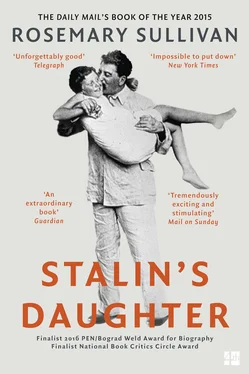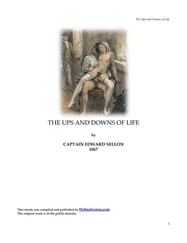Perhaps Stalin’s worst characteristic as a husband was the tantalizing quality of his affection. With her pride and reticence, Nadya rarely revealed family secrets, but her sister Anna remarked that she was a “long-suffering martyr.” Stalin, usually distant and inscrutable, could flare up with an uncontrollable temper and could be callously indifferent to his wife’s feelings. Nadya complained that she was always running Stalin’s errands—he needed a document in the commissar’s office; he needed a book from the library. “We wait for him, but never know when he will come home.” 18
Nadya’s second year at the Industrial Academy, 1929, was the Year of the Great Turn and the forced collectivization of the peasantry into kolkhozy, or collective farms. The process was brutal. In order to root out private enterprise, village markets were shut down and livestock was confiscated. Kulaks, or prosperous peasants (owning one cow could constitute prosperity), were deported. Under this policy, known as dekulakization, peasants, “treated like livestock . . . often died in transit because of cold, starvation, beatings in the convoys, and other miseries.” 19By the year of Nadya’s death, 1932, the infamous Gulag (forced-labor camps) held “more than a quarter of a million people,” and 1.3 million, “mainly deported kulaks,” were living as “special settlers.” 20
In 1932 and 1933, famine raged in the Ukraine. Stalin and his ministers were shipping grain supplies abroad to pay for smelters and tractors in order to sustain the rapid pace of industrialization. Though the Ukraine Politburo begged for emergency relief, no assistance came. Millions died. In 1932, a number of Nadya’s fellow students at the Industrial Academy were arrested for speaking out about the famine. Nadya, too, was rumored to oppose “collectivisation and its immorality.” Critical of Stalin, she secretly sympathized with Nikolai Bukharin and the right-wing opposition. 21Stalin commanded Nadya to stay away from the Academy for two months. 22
In the early days, Nadya attempted to exert some influence. When Stalin was vacationing alone in Sochi in September 1929, Nadya wrote him a careful letter, reporting that the Party was exploding over a dispute at Pravda ; an article had been published without first being cleared by the Party hierarchy. Though many had seen the article, everyone was laying the blame on her friend Leonid Kovalev, and demanding his dismissal. In a long letter with the simple salutation “Dear Josef,” she wrote:
Don’t be angry with me, but seriously I felt pain for Kovalev, for I know the colossal work that he has done in the paper. . . . To dismiss Kovalev . . . is simply monstrous. . . . Kovalev looks like a dead man. . . . I know that you detest my interference, but still I believe that you should look into this absolutely unjust outcome. . . . I cannot be indifferent about the fate of such a good worker and comrade of mine. . . . Good-bye, now, I kiss you tenderly. Please, answer me. 23
Stalin wrote back four days later: “Tatka! Got your letter regarding Kovalev. . . . I believe you are right. . . . Obviously, in Kovalev they have found a scapegoat. I will do all I can, if it is not too late. . . . I kiss my Tatka many, many, many times. Yours, Josef.” 24Stalin did act on Nadya’s request and wrote to Sergo Ordzhonikidze, in charge of adjudicating cases of disobedience to Party policies, to say that scapegoating Kovalev was “a very cheap but wrong and unbolshevik method of correcting one’s faults. . . . Kovalev . . . IN NO CIRCUMSTANCES WOULD EVER let one line about Leningrad be printed, had it not been silently or directly approved, by somebody at the bureau.” 25Kovalev was eventually dismissed from Pravda— not as an “enemy of the people” but rather as “a straying son of the Party.” 26
Nadya wrote back rather pathetically: “I am very glad that in Kovalev’s matter you have shown me your trust” and went on to report that the Academy was very friendly. “The academic achievements are judged according to rules: ‘kulak,’ the ‘center,’ the ‘poor one.’ We laugh a lot daily about that. I am already characterized as a right-wing,” a strange admission to make to Stalin who would soon destroy the so-called right-wing opposition. 27
There were clearly mounting tensions between Nadya and Stalin. She wrote in the summer of 1930, “This summer I did not feel that you might be pleased with a postponing of my departure, quite the contrary. The last summer I did feel that, but not now. . . . Answer me, if not too displeased by my letter, or rather, as you wish.” 28He wrote back to say that her reproaches were “unjust.” 29In October she wrote, “No news from you. . . . Maybe hunting quails absorbed you too much, or just too lazy to write.” 30Stalin responded with irony: “Lately you have begun to praise me. What does that mean? Good or bad news?” 31Nadya’s letters to Stalin in Sochi often contained reports of the hunger in Moscow, the long lines for food, the lack of fuel, the disrepair of the city. “Moscow looks better now, but in some places like a woman who covered with powder her defects, especially after rains, when the paint runs in stripes. . . . One wishes so that these shortcomings would one day leave our lives, and people would then feel wonderful and work remarkably well.” 32
By the time of her suicide, it is possible that Nadya was not schizophrenic but rather disillusioned with her husband’s revolutionary politics. The night of her death, she refused to raise her glass in Stalin’s toast to “the destruction of enemies of the state.”
Nadya’s friend Irina Gogua, who had known her since their shared childhood in Georgia, when the Alliluyev children, having no bathroom in their own apartment, had come for weekly Saturday baths at her house, remembered how Nadya behaved in Stalin’s presence.
[Nadya] understood a lot. When I returned [to Moscow], I understood that her friends were arrested somewhere in Siberia. She . . . demanded to see their case. So she understood a lot. . . . In the presence of Joseph she resembled a fakir, who performs in the circus barefoot walking over broken glass. With a smile for the audience and with a terrifying intensity in her eyes. This is what she was like in the presence of Joseph, because she never knew what was coming next—what kind of explosion—he was a real cad. The only creature who softened him was Svetlana.
Gogua was not surprised when she heard the gossip that Nadya had committed suicide. Though the truth about her suicide was immediately suppressed, Gogua claimed that it was known among the security organizations. She added an interesting detail to her story. “Nadezhda had very perfect features and very beautiful features. But here is the paradox. The fact that she was beautiful was observed only after her death. . . . In the presence of Joseph, she was always like a fakir—always internally tense.” 33
As recently as 2011, Alexander Alliluyev, the son of Nadya’s brother Pavel, offered a convincing detail in the puzzle of Nadya’s suicide with a piece of the story that came to him from his parents. 34
Pavel was at work when he heard the news that his sister had committed suicide. He immediately phoned his wife, Zhenya. He told her to stay where she was; he’d be right home. When he arrived, he asked where she had hidden the packet of papers that Nadya had given them. “In the linen,” Zhenya replied. “Get them,” he told her.
Nadya had been planning to leave Stalin. She intended to go to Leningrad and had even asked Sergei Kirov, head of the Communist Party organization there, about getting a job in the city. In the packet of papers she left with her brother was supposedly a parting letter for him and his wife.
Zhenya kept the existence of the letter secret for two decades and spoke to her son, Alexander, of its contents only in 1954, after Stalin’s death. She told her son that Nadya had written that she “could not live with Stalin anymore. You take him for someone else. But he is a two-faced Janus. He will step over everybody in the world, including you.” Alexander commented, “We all came to know what kind of a person Comrade Stalin was, but at the time, only Nadya knew about this.”
Читать дальше











![John Bruce - The Lettsomian Lectures on Diseases and Disorders of the Heart and Arteries in Middle and Advanced Life [1900-1901]](/books/749387/john-bruce-the-lettsomian-lectures-on-diseases-and-disorders-of-the-heart-and-arteries-in-middle-and-advanced-life-1900-1901-thumb.webp)
